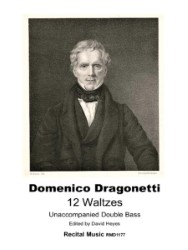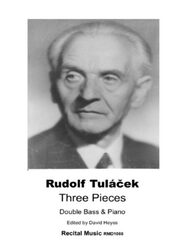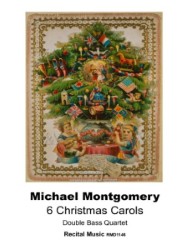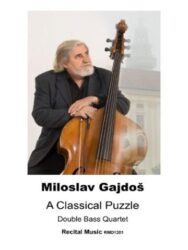Transcription Series Book 1
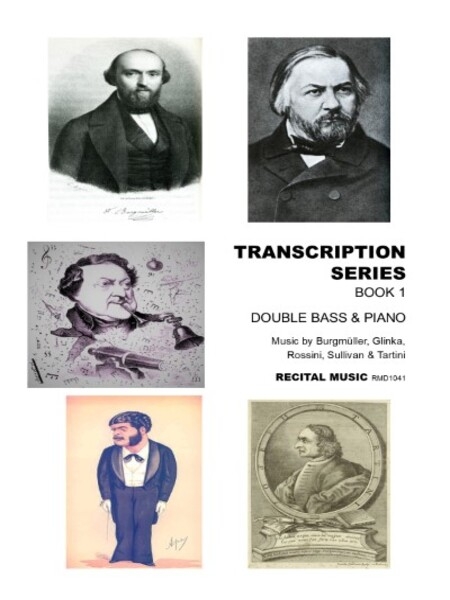
Composer: Various
Arranger: David Heyes
Instrumentation: Double Bass and Piano
Publisher:
| Product Code: | RMD1041 |
| Publishers Number: | RMD1041 |
| Language: | English |
| Condition: | New |
No. 2 Mikhail Glinka: Two Russian Arias (arr. N. Rimsky-Korsakov): 1) Susanin’s Aria 2) Ruslan’s Aria
No. 3 Gioacchino Rossini: Une Larme (A Tear)
No. 4 Arthur Sullivan: Idyll
No. 5 Giuseppe Tartini – Adagio Cantabile
Trinity College London Grade 7 Group A: Rossini Une Larme
MTB – Grade 7
The Transcription Series Book 1 brings together five fun and accessible works for the intermediate bassist, arranged by David Heyes.
Ideal as either study or recital…
Ideal as either study or recital repertoire, each piece offers a range of musical and technical challenges, primarily in the orchestral register, and emphasising the lyrical and cantabile potential of the double bass
Johann Friedrich Burgmüller – Nocturne No.1 for double bass & piano
Nocturne No.1 has been very popular with intermediate students who are not quite ready to play in thumb position yet but have a good knowledge of the positions up to harmonic G (one octave above the open string). The advanced version is played primarily in thumb position and emphasizes the lyrical and cantabile qualities of the double bass. Both accompaniments are for orchestral tuning.
19th-century German composer-pianist J.F. Burgmüller (1806-1874) lived most of his life in Paris and wrote in a lyrical and romantic style, typical of the age, and composed a series of collections of teaching pieces for the beginner pianist.
Mikhail Glinka: Two Russian Arias for double bass & piano (arranged by N. Rimsky-Korsakov)
Nikolai Rimsky-Korsakov arranged eight operatic arias for string orchestra in the mid-1880s. Taken from A Life for the Tsar (Ivan Susanin) and Ruslan and Ludmilla,
the first and last are for soloist and the strings and the others are for string orchestra.
Susanin’s Aria is the last of the suite and is for solo double bass and string orchestra. The slow and expressive vocal line makes effective use of the low and sonorous register of the double bass with a simple and supportive accompaniment. The middle section is more animated before a dramatic and inventive coda.
Ruslan’s Aria is the first work of the suite and was originally for solo cello and string orchestra. A slow introduction and accompanied recitative set the scene, leading into a lyrical and evocative aria with its gently moving and flowing accompaniment.
Mikhail Glinka (1804-1857) is recognized as the father of the Russian national school and was a great influence on several generations of composers including Balakirev, Rimsky-Korsakov, Mussorgsky, Borodin, and Tchaikovsky. His first opera, A Life for the Tsar (1836), established him as the leading composer of the day, and its national character and folk influences helped to create a new Russian musical language.
Gioacchino Rossini: Une Larme (A Tear) for double bass & piano
A beautiful and poignant lament which is ideally suited to the double bass. Originally for cello, this new edition returns to the cello version [Theme & Variations] adding an extended (but optional) piano introduction and demonstrates the dark and soulful colors of the solo double bass. Long flowing phrases allow the intermediate bassist to demonstrate both musical and technical accomplishment in an accessible range of the instrument. The soulful and wistful melody transcribes beautifully for double bass allowing the instrument to display its bel canto and lyrical capabilities.
A three-bar phrase towards the end of the piece is playable as written or an octave higher, giving bassists the opportunity to play high harmonics within a beautiful and evocative melody.
Gioacchino Rossini (1792-1868) is one of the most fascinating of all 19th-century composers and, at the age of 38 and after the production of his opera Guillaume Tell (William Tell), he retired. By this time, he had already composed 39 operas, alongside much vocal and instrumental music, and although his ‘retirement’ lasted for almost forty years he was far from idle and continued to compose, but mainly for his own pleasure and amusement.
Arthur Sullivan: Idyll for double bass & piano
Idyll for cello and piano was composed in 1865 and published in a souvenir book of the Charing Cross Hospital Bazaar held at the Royal Albert Hall (London) on 21-22 June 1899. The book had contributions from 39 writers and 9 composers including Sullivan. Idyll was completed on 31 July 1865 and was ‘composed for and dedicated to his friend Col. P. Paget (Farnham)’. In the previous week Col. Patrick Paget (1820-1879) had been Sullivan’s host in Farnham (Surrey), a town not far from Sandhurst, where Sullivan’s father was Master of the Band at the Royal Military College.
Idyll is a charming and elegant novelty, emphasizing the lyrical and sonorous qualities of the double bass. The accompaniment is chordal and supportive, allowing the soloist to weave long and sinuous melodies in a rich and lyrical register.
This edition includes accompaniments for both solo and orchestral tuning.
Giuseppe Tartini – Adagio Cantabile for double bass & piano
The first movement of Tartini’s Violin Sonata in G major has a life beyond its place in the sonata. Although originally marked Andante, it was rechristened Adagio Cantabile by an editor long ago, which is obviously more descriptive and evocative than the simple Andante and has now been arranged for many solo instruments.
The three-movement sonata was believed to have been composed in 1743, and this new edition is based on an edition by Friedrich Hermann (1828-1907) and first published by C.F. Peters. The edition includes piano accompaniments for both solo and orchestral tuning. It demonstrates the lyrical and cantabile qualities of the double bass and uses the solo register to create music of great elegance and distinction.
Giuseppe Tartini (1692-1770) was an Italian violinist and composer and is best known today for his Devil’s Trill Sonata which includes many technical challenges featuring demanding double stop trills, and legend has it that he was inspired to write it after a dream in which the devil appeared at the foot of his bed.
In 1728 Tartini founded his violin school in Padua, ‘Scuola di Nazioni’, whose fame became acknowledged across Europe. Tartini’s playing was said to be remarkable for its technical and lyrical qualities. He was regarded with universal pride by the inhabitants of Padua and died there on 26 February 1770.
Digital Download – PDF
Shipping costs: No shipping
R.R.P £12.50
Our Price: £10.63
You might also like
-
12 Waltzes for Double Bass
£7.23 -
3 Pieces for Double Bass and Piano
£10.63 -
6 Christmas Carols
£10.63 -
A Classical Puzzle
£7.23

